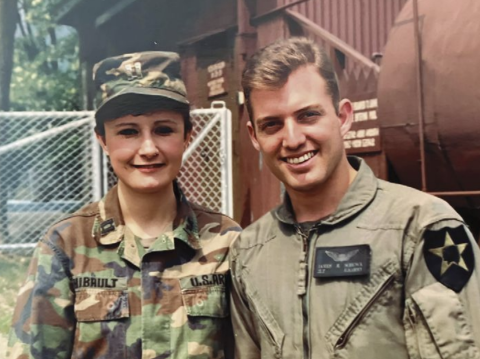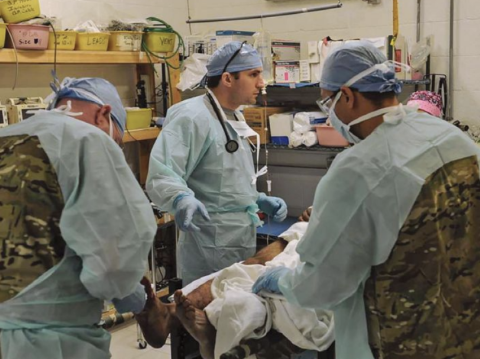Published in West Point Magazine Summer 2025 Issue; shared courtesy of Jason Hawksworth, MD.
Going by Cullum Number, the reference and identifi cation system devised by Brevet Major General George W. Cullum (Class of 1833) to catalog each West Point graduate, more than 11,000 graduates separate James Schenck ’88 and Jason Hawksworth ’00; however, after an event that occurred in September 2024, there may be no closer members in the entire Long Gray Line than these two.
Two years after Schenck graduated from West Point (and six years before Hawksworth entered the Academy as a new cadet), he married Lisa Thibault, whom he met while he was stationed at Camp Stanley in South Korea flying helicopters for the 2nd Battalion (Assault), 2nd Aviation Regiment. During several flight assignments, he transported Lisa, then an Army JAG captain, so that she could meet and interview witnesses for her military justice cases. Sparks flew, and they were married in December 1990. After being stationed at Camp Humphreys in South Korea, where Schenck flew with the 1st Battalion, 501st Aviation Regiment, 17th Aviation Brigade, the couple moved to Fort Rucker, Alabama.

Schenck left Fort Rucker to attend Harvard Business School, with orders for a follow-on tour in the Department of Social Sciences at the U.S. Military Academy to teach economics and personal finance.
Lisa, then a major with experience serving as a military prosecutor in the 2nd Infantry Division, also received an assignment at West Point, becoming an assistant professor in the Department of Law teaching “Introduction to Legal Methods” and “Constitutional and Military Law” to cadets (during her first semester at West Point, one of her students was nowBrigadier General Shane Reeves ’96, the 15th Dean of the Academic Board).
In 2023, Lisa was diagnosed with an aggressive form of bile duct cancer, with a large tumor in her liver. The prognosis was grim—the doctors she first consulted estimated she had only six months to live. Despite undergoing 23 grueling chemotherapy treatment sessions, Lisa’s condition remained precarious, and her medical team was running out of options. The only possible solution was a complex, high-risk, invasive liver resection, a surgery that would remove the tumor and 50 percent of her liver and would require the reconstruction of her vena cava (the vein to the heart). As one can imagine, there are only a few surgeons in the world with the skills needed for this rare and specialized form of liver surgery. Hawksworth is one of them.

Hawksworth pursued a medical career upon graduating from West Point, obtaining his medical degree from Wake Forest University’s Bowman Gray School of Medicine through the U.S. Army’s Health Professions Scholarship Program. He completed his general surgery residency at Walter Reed Army Medical Center, followed by an abdominal transplant and hepatobiliary surgery fellowship at Georgetown University Hospital. He served on active duty for 11 years, deployed overseas for most of that time. Although assigned to Walter Reed Army Medical Center, Hawksworth served in numerous down-range operations, including in Afghanistan (twice), Kuwait, and Saudi Arabia. While deployed to Afghanistan in 2015, he earned his Combat Medical Badge. Hawksworth left active duty and joined the Army Reserve (for which he is now a colonel) and eventually specialized in abdominal organ transplants and surgery, earning the title of surgical director of adult liver transplantation and chief of hepatobiliary surgery at New York Presbyterian Hospital/Columbia University Irving Medical Center in New York City. This is where the two West Point graduates, Schenck and Hawksworth, met in 2024.
Hawksworth was recommended to Schenck while he was searching for a surgeon to perform the difficult surgery his wife needed. In reviewing Hawksworth’s bio Schenck noticed he was a graduate of the U.S. Military Academy. While Schenck understood USMA was not a medical school, he knew, as a fellow graduate himself, how the skills and habits Hawksworth learned at West Point would prove valuable to the challenging circumstances he and his wife were facing. Furthermore, he knew that Hawksworth shared the values needed for the situation, values that are inculcated in every West Point cadet of every generation: the “never quit” mentality; the striving for excellence in all endeavors; the willingness to take the calculated risks needed to overcome a difficult situation—in short, “Duty, Honor, Country.”
“When we met in person, we discussed West Point and our time there when we were each cadets,” Schenck said. “I explained to him that West Point taught me the concept of ‘Cooperate and Graduate.’” Schenck told Hawksworth that this concept served him well when, in 2014, he was selected as the president and CEO of PenFed Credit Union, where he has surrounded himself with the best across the fields of finance, technology, marketing, and more. “Here, I needed someone with a very unique surgical skill to save my wife’s life, and I knew, based on his West Point background, Dr. Hawksworth had the foundation and skill set to succeed.”
On September 5, 2024, Lisa entered the operating room and placed her life in the hands of a man whose career, like her husband’s, had been shaped by West Point’s rigorous training and commitment to excellence. Hawksworth performed a lifesaving hepatectomy, removing Lisa’s liver, cutting it in half, and reconstructing the arteries using a graft. The eight-hour procedure was a success. Today, Lisa is serving as the associate dean for national security, cybersecurity, and foreign relations law at the George Washington University Law School and her prognosis is bright. Nearly a year after surgery, she is recovering well, thanks to Hawksworth and his team’s unparalleled expertise and dedication.
The Schenck-Hawksworth connection is a powerful example of how West Point’s core values extend far beyond the battlefield, and it serves as a reminder that the cooperation cadets give one another during the 47-month road to graduation means there is no member of the Long Gray Line—from the Oldest Living Graduate, Cullum Number 12516, to the most recent graduate, with a Cullum Number in the 81720-82720 range—who will abandon another (or his or her spouse) in a time of need.
Related:
- Changing the Future of Living Liver Donation: A Conversation about Columbia’s All-Robotic Approach
- Bots for Tots: The First Program in the U.S. for Robotic Liver Surgery in Children
- Xenotransplantation, a Quest to Solve the Pediatric Donor Heart Crisis

